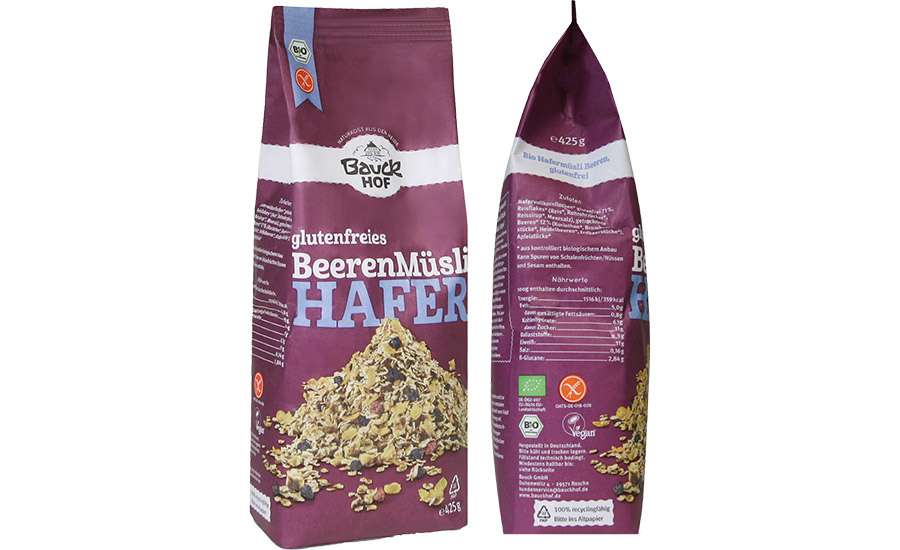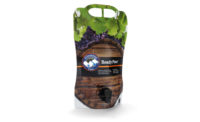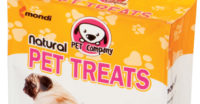For the last 20 years, stand-up pouches have experienced tremendous growth in the flexible packaging segment, and now a German-based food producer is turning to a paper-based pouch format to meet crucial marketing objectives. Bauck GmbH, a producer of gluten-free organic flour and grains, recently unveiled a paper-based pouch for a range of product offerings in Europe — using Rovema’s SBS form-fill-seal machine for both plastic-based and paper pouch production runs.
The switch for the company to the paper-based packaging format coincided with the building of a new, modern plant in Lower Saxony, Germany, where seven floors of various raw materials are turned into gluten-free flakes and more than 160,000 bags are produced each day.

Courtesy of Bauck GmbH
The organic-based company now uses paper bags for most of its products. “The consumer is now much more satisfied with paper and we’re increasingly using alternatives like mono-PP for those products where plastic has to be used,” says Hannes Öhler, head of marketing and communication at Bauck GmbH. Plastic film cannot be avoided for products like oat pops due to product absorption of moisture.
The move to paper was a huge challenge, and Bauck GmbH relied on Rovema to thoroughly test the packaging material and applications before making this critical packaging format change. Rovema tested the new paper-based packaging material at its technical e-center in Germany that provides continuous research and development but also executes customer-specific performance tests to validate new packaging material and applications.

Courtesy of Bauck GmbH
Bauck GmbH uses Rovema’s SBS Twin f/f/s packaging machines and runs paper-based film web for multiple formats, including gable top or block-bottom bags. In the first production run of paper-based flat film with a gable top, the food producer had trouble when folding the bag in the machine, with tears or holes appearing in various places.
Together with Rovema and packaging material supplier Sappi, Markus Stahl, production manager at Bauck GmbH, was able to quickly resolve this issue. The paper bag now works well for classic transport from the mill via the packaging machine, tray carton, warehouse and transport to the supermarket, according to Stahl.
Sappi Global supplies Guard Nature1-MS roll-based paper film to Bauck and the material includes an integrated barrier coating against mineral oil (MOSH/MOAH) and grease, along with heat-sealable properties. Sappi launched the composite material specifically for the food industry and pouches and bag applications for dry and slightly oily foods — pasta, rice, cereals and various powders. The paper can be recycled and the barrier coating protects against mineral oil for a minimum of 15 months, according to Sappi Global.

Courtesy of Bauck GmbH
As with most f/f/s applications, sealing times and testing are critical for high-volume packaging operations, but even more so with a new packaging material.
“If there is dust in the sealing area, we can‘t seal the seam as well as with a plastic film,” says Stahl. “With plastic, the machine works well with contact pressures or temperature, while paper rolls are very limited in this way. So production operators leave more room and moreover all the bags have become a bit longer as a result,” says Stahl.
With the excess material, Bauck now folds the top fin of the flakes and presents a compact, block-bottom bag, according to Stahl. The new bag shape requires an adjustment downstream, but the block-bottom format saves on transport and storage costs. In addition to oat flakes, other products such as spelt flakes or 3-, 4- or 6-grain flakes will be gradually switched to the new, paper-based packaging, according to Bauck.

Courtesy of Bauck GmbH
Flexible Machine Production
As with any food production plant, utilization is highly valued and the f/f/s machine offers Bauck the ability to run plastic and paper on the same machine while producing a range of packaging formats: 250 g to 1 kg bags. This auger-based f/f/s system can produce up to 100 paper bags/min.
The f/f/s system carries a PC-based P@ck-Control system with touchscreen and integrated help functions. Plus, a network connection with the Rovema service center is also an option for online diagnosis and maintenance of the control software. The f/f/s packaging system also includes downstream systems for bag head and closure design with modular construction. Another important feature for Bauck is the system’s ability to accommodate chunky, granulated and powdery products from the food sector.
This plant’s flexibility and utilization are essential ingredients to growth for Bauck with its range of organic product offerings. This modernization and f/f/s machine investment should help Bauck meet the challenges ahead in the ever-changing world of consumer behavior and sustainability.


